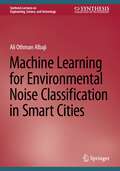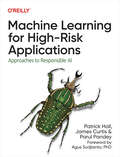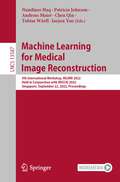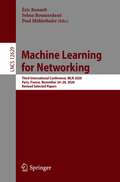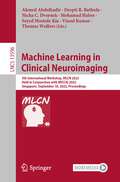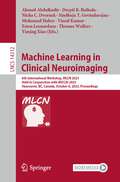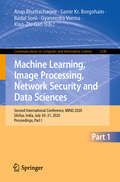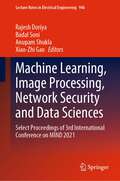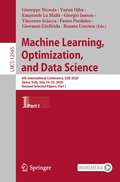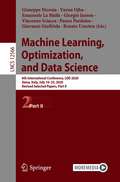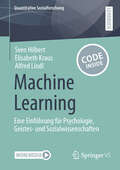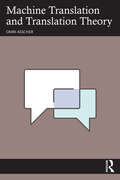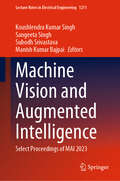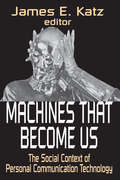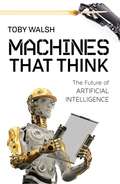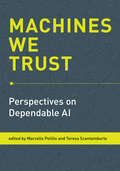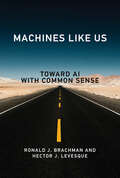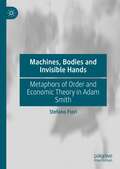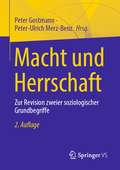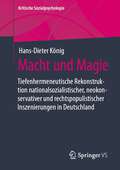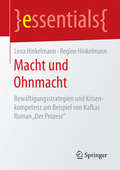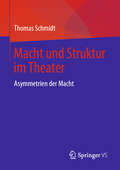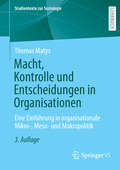- Table View
- List View
Machine Learning for Environmental Noise Classification in Smart Cities (Synthesis Lectures on Engineering, Science, and Technology)
by Ali Othman AlbajiWe present a Machine Learning (ML) approach to monitoring and classifying noise pollution. Both methods of monitoring and classification have been proven successful. MATLAB and Python code was generated to monitor all types of noise pollution from the collected data, while ML was trained to classify these data. ML algorithms showed promising performance in monitoring the different sound classes such as highways, railways, trains and birds, airports and many more. It is observed that all the data obtained by both methods can be used to control noise pollution levels and for data analytics. They can help decision making and policy making by stakeholders such as municipalities, housing authorities and urban planners in smart cities. The findings indicate that ML can be used effectively in monitoring and measurement. Improvements can be obtained by enhancing the data collection methods. The intention is to develop more ML platforms from which to construct a less noisy. The second objective of this study was to visualize and analyze the data of 18 types of noise pollution that have been collected from 16 different locations in Malaysia. All the collected data were stored in Tableau software. Through the use of both qualitative and quantitative measurements, the data collected for this project was then combined to create a noise map database that can help smart cities make informed decisions.
Machine Learning for High-Risk Applications: Approaches to Responsible AI
by Patrick Hall James Curtis Parul PandeyThe past decade has witnessed the broad adoption of artificial intelligence and machine learning (AI/ML) technologies. However, a lack of oversight in their widespread implementation has resulted in some incidents and harmful outcomes that could have been avoided with proper risk management. Before we can realize AI/ML's true benefit, practitioners must understand how to mitigate its risks. This book describes approaches to responsible AI—a holistic framework for improving AI/ML technology, business processes, and cultural competencies that builds on best practices in risk management, cybersecurity, data privacy, and applied social science. Authors Patrick Hall, James Curtis, and Parul Pandey created this guide for data scientists who want to improve real-world AI/ML system outcomes for organizations, consumers, and the public. Learn technical approaches for responsible AI across explainability, model validation and debugging, bias management, data privacy, and ML securityLearn how to create a successful and impactful AI risk management practiceGet a basic guide to existing standards, laws, and assessments for adopting AI technologies, including the new NIST AI Risk Management FrameworkEngage with interactive resources on GitHub and Colab
Machine Learning for Medical Image Reconstruction: 5th International Workshop, MLMIR 2022, Held in Conjunction with MICCAI 2022, Singapore, September 22, 2022, Proceedings (Lecture Notes in Computer Science #13587)
by Patricia Johnson Andreas Maier Tobias Würfl Nandinee Haq Jaejun Yoo Chen QinThis book constitutes the refereed proceedings of the 5th International Workshop on Machine Learning for Medical Reconstruction, MLMIR 2022, held in conjunction with MICCAI 2022, in September 2022, held in Singapore.The 15 papers presented were carefully reviewed and selected from 19 submissions. The papers are organized in the following topical sections: deep learning for magnetic resonance imaging and deep learning for general image reconstruction.
Machine Learning for Networking: Third International Conference, MLN 2020, Paris, France, November 24–26, 2020, Revised Selected Papers (Lecture Notes in Computer Science #12629)
by Selma Boumerdassi Éric Renault Paul MühlethalerThis book constitutes the thoroughly refereed proceedings of the Second International Conference on Machine Learning for Networking, MLN 2019, held in Paris, France, in December 2019. The 26 revised full papers included in the volume were carefully reviewed and selected from 75 submissions. They present and discuss new trends in deep and reinforcement learning, pattern recognition and classification for networks, machine learning for network slicing optimization, 5G system, user behavior prediction, multimedia, IoT, security and protection, optimization and new innovative machine learning methods, performance analysis of machine learning algorithms, experimental evaluations of machine learning, data mining in heterogeneous networks, distributed and decentralized machine learning algorithms, intelligent cloud-support communications, ressource allocation, energy-aware communications, software de ned networks, cooperative networks, positioning and navigation systems, wireless communications, wireless sensor networks, underwater sensor networks.
Machine Learning in Clinical Neuroimaging: 5th International Workshop, MLCN 2022, Held in Conjunction with MICCAI 2022, Singapore, September 18, 2022, Proceedings (Lecture Notes in Computer Science #13596)
by Vinod Kumar Seyed Mostafa Kia Mohamad Habes Ahmed Abdulkadir Thomas Wolfers Deepti R. Bathula Nicha C. DvornekThis book constitutes the refereed proceedings of the 5th International Workshop on Machine Learning in Clinical Neuroimaging, MLCN 2022, held in Conjunction with MICCAI 2022, Singapore in September 2022. The book includes 17 papers which were carefully reviewed and selected from 23 full-length submissions.The 5th international workshop on Machine Learning in Clinical Neuroimaging (MLCN2022) aims to bring together the top researchers in both machine learning and clinical neuroscience as well as tech-savvy clinicians to address two main challenges: 1) development of methodological approaches for analyzing complex and heterogeneous neuroimaging data (machine learning track); and 2) filling the translational gap in applying existing machine learning methods in clinical practices (clinical neuroimaging track).The papers are categorzied into topical sub-headings: Morphometry; Diagnostics, and Aging, and Neurodegeneration.
Machine Learning in Clinical Neuroimaging: 6th International Workshop, MLCN 2023, Held in Conjunction with MICCAI 2023, Vancouver, BC, Canada, October 8, 2023, Proceedings (Lecture Notes in Computer Science #14312)
by Vinod Kumar Yiming Xiao Mohamad Habes Ahmed Abdulkadir Thomas Wolfers Deepti R. Bathula Nicha C. Dvornek Sindhuja T. Govindarajan Esten LeonardsenThis book constitutes the refereed proceedings of the 6th International Workshop on Machine Learning in Clinical Neuroimaging, MLCN 2023, held in Conjunction with MICCAI 2023 in Vancouver, Canada, in October 2023. The book includes 16 papers which were carefully reviewed and selected from 28 full-length submissions.The 6th International Workshop on Machine Learning in Clinical Neuroimaging (MLCN 2023) aims to bring together the top researchers in both machine learning and clinical neuroscience as well as tech-savvy clinicians to address two main challenges: 1) development of methodological approaches for analyzing complex and heterogeneous neuroimaging data (machine learning track); and 2) filling the translational gap in applying existing machine learning methods in clinical practices (clinical neuroimaging track).The papers are categorzied into topical sub-headings on Machine Learning and Clinical Applications.
Machine Learning, Image Processing, Network Security and Data Sciences: Second International Conference, MIND 2020, Silchar, India, July 30 - 31, 2020, Proceedings, Part I (Communications in Computer and Information Science #1240)
by Xiao-Zhi Gao Arup Bhattacharjee Samir Kr. Borgohain Badal Soni Gyanendra VermaThis two-volume set (CCIS 1240-1241) constitutes the refereed proceedings of the Second International Conference on Machine Learning, Image Processing, Network Security and Data Sciences, MIND 2020, held in Silchar, India. Due to the COVID-19 pandemic the conference has been postponed to July 2020. The 79 full papers and 4 short papers were thoroughly reviewed and selected from 219 submissions. The papers are organized according to the following topical sections: data science and big data; image processing and computer vision; machine learning and computational intelligence; network and cyber security.
Machine Learning, Image Processing, Network Security and Data Sciences: Select Proceedings of 3rd International Conference on MIND 2021 (Lecture Notes in Electrical Engineering #946)
by Xiao-Zhi Gao Anupam Shukla Badal Soni Rajesh DoriyaThis book constitutes the refereed proceedings of the Third International Conference on Machine Learning, Image Processing, Network Security and Data Sciences, MIND 2021. The papers are organized according to the following topical sections: data science and big data; image processing and computer vision; machine learning and computational intelligence; network and cybersecurity. This book aims to develop an understanding of image processing, networks, and data modeling by using various machine learning algorithms for a wide range of real-world applications. In addition to providing basic principles of data processing, this book teaches standard models and algorithms for data and image analysis.
Machine Learning, Optimization, and Data Science: 6th International Conference, LOD 2020, Siena, Italy, July 19–23, 2020, Revised Selected Papers, Part I (Lecture Notes in Computer Science #12565)
by Panos Pardalos Giuseppe Nicosia Giovanni Giuffrida Renato Umeton Vincenzo Sciacca Varun Ojha Emanuele La Malfa Giorgio JansenThis two-volume set, LNCS 12565 and 12566, constitutes the refereed proceedings of the 6th International Conference on Machine Learning, Optimization, and Data Science, LOD 2020, held in Siena, Italy, in July 2020.The total of 116 full papers presented in this two-volume post-conference proceedings set was carefully reviewed and selected from 209 submissions. These research articles were written by leading scientists in the fields of machine learning, artificial intelligence, reinforcement learning, computational optimization, and data science presenting a substantial array of ideas, technologies, algorithms, methods, and applications.
Machine Learning, Optimization, and Data Science: 6th International Conference, LOD 2020, Siena, Italy, July 19–23, 2020, Revised Selected Papers, Part II (Lecture Notes in Computer Science #12566)
by Panos Pardalos Giuseppe Nicosia Giovanni Giuffrida Renato Umeton Vincenzo Sciacca Varun Ojha Emanuele La Malfa Giorgio JansenThis two-volume set, LNCS 12565 and 12566, constitutes the refereed proceedings of the 6th International Conference on Machine Learning, Optimization, and Data Science, LOD 2020, held in Siena, Italy, in July 2020. The total of 116 full papers presented in this two-volume post-conference proceedings set was carefully reviewed and selected from 209 submissions. These research articles were written by leading scientists in the fields of machine learning, artificial intelligence, reinforcement learning, computational optimization, and data science presenting a substantial array of ideas, technologies, algorithms, methods, and applications.
Machine Learning: Eine Einführung für Psychologie, Geistes- und Sozialwissenschaften (Quantitative Sozialforschung)
by Alfred Lindl Sven Hilbert Elisabeth KrausDieses Buch richtet sich an alle, welche die enormen Potenziale maschinellen Lernens für wissenschaftliche Fragestellungen und innovative Ansätze in Studium oder Beruf nutzen möchten. Denn maschinelles Lernen eröffnet neue Möglichkeiten zum effizienten Umgang mit umfassenden, komplex strukturierten und sich schnell entwickelnden Daten. Zunächst werden Grundideen und typische Anwendungsfelder maschinellen Lernens sowie dessen Vorzüge gegenüber inferenzstatistischen Verfahren erläutert. Daran schließen praktische Hinweise dazu an, wie Daten für maschinelle Lernprozesse aufbereitet werden und wie diese durch Anpassung verschiedener Parameter möglichst optimale Ergebnisse erzielen können. Von den hierzu einsetzbaren Modellen werden die gängigsten theoretisch und anhand anschaulicher Beispiele vorgestellt. Auch auf verschiedene Optionen zur besseren Interpretierbarkeit sowie auf spezifische Limitationen von Analyseresultaten wird eingegangen. Weiterführende Anwendungsfälle und verständlich kommentierte Analysecodes sind auf dem GitHub-Repositorium zu diesem Buch auf SpringerLink online verfügbar.
Machine Translation and Translation Theory
by Omri AsscherPervasive and ubiquitous, machine translation systems have been transforming communication and understanding across languages and cultures on a historical scale. Focused on both Neural Machine Translation tools, such as Google Translate, and generative AI tools, such as ChatGPT, Omri Asscher pursues the juncture between machine translation and the diverse, often competing, frameworks of human translation theory. He shines a light on the subtleties of the intersection between the two: the places where machine translation corresponds well with the ideas that have been developed on human translation throughout the years, and the places where machine translation seems to challenge translation theory, and perhaps even require that we rethink some of its basic assumptions.Machine Translation and Translation Theory reflects the need for an accessible, panoramic view on the subject. It offers a detailed discussion of various points of theoretical interest: definitions of translation; equivalence in translation; aesthetics of translation; translation ethics; translation as cross-cultural communication; and translation's historical agency.This is key reading for researchers and students in translation studies, as well as scholars of AI-mediated communication, and computer scientists interested in how machine translation architectures correspond with the understanding of translation in the humanities.
Machine Vision and Augmented Intelligence: Select Proceedings of MAI 2023 (Lecture Notes in Electrical Engineering #1211)
by Sangeeta Singh Manish Kumar Bajpai Koushlendra Kumar Singh Subodh SrivastavaThis book comprises the proceedings of the International Conference on Machine Vision and Augmented Intelligence (MAI 2023). The conference proceedings encapsulate the best deliberations held during the conference. The diversity of participants in the event from academia, industry, and research reflects in the articles appearing in the volume. The book theme encompasses all industrial and non-industrial applications in which a combination of hardware and software provides operational guidance to devices in the execution of their functions based on the capture and processing of images. This book covers a wide range of topics such as modeling of disease transformation, epidemic forecast, COVID-19, image processing and computer vision, augmented intelligence, soft computing, deep learning, image reconstruction, artificial intelligence in healthcare, brain-computer interface, cybersecurity, and social network analysis, natural language processing, etc.
Machines That Become Us: The Social Context of Personal Communication Technology
by James E. KatzSocial critics and artificial intelligence experts have long prophesized that computers and robots would soon relegate humans to the dustbin of history. Many among the general population seem to have shared this fear of a dehumanized future. But how are people in the twenty-first century actually reacting to the ever-expanding array of gadgets and networks at their disposal? Is computer anxiety a significant problem, paralyzing and terrorizing millions, or are ever-proliferating numbers of gadgets being enthusiastically embraced? Machines that Become Us explores the increasingly intimate relationship between people and their personal communication technologies.In the first book of its kind, internationally recognized scholars from the United States and Europe explore this topic. Among the technologies analyzed include the Internet, personal digital assistants (PDAs), mobile phones, networked homes, smart fabrics and wearable computers, interactive location badges, and implanted monitoring devices. The authors discuss critical policy issues, such as the problems of information resource access and equity, and the recently discovered digital dropouts phenomena.The use of the word become in the book's title has three different meanings. The first suggests how people use these technologies to broaden their abilities to communicate and to represent themselves to others. Thus the technologies become extensions and representatives of the communicators. A second sense of become applies to analysis of the way these technologies become physically integrated with the user's clothing and even their bodies. Finally, contributors examine fashion aspects and uses of these technologies, that is, how they are used in ways becoming to the wearer. The conclusions of many chapters are supported by data, including ethnographic observations, attitude surveys and case studies from the United States, Britain, France, Italy, Finland, and Norway. This approach is especially valuable
Machines That Think: The Future of Artificial Intelligence
by Toby WalshA scientist who has spent a career developing Artificial Intelligence takes a realistic look at the technological challenges and assesses the likely effect of AI on the future. How will Artificial Intelligence (AI) impact our lives? Toby Walsh, one of the leading AI researchers in the world, takes a critical look at the many ways in which "thinking machines" will change our world.Based on a deep understanding of the technology, Walsh describes where Artificial Intelligence is today, and where it will take us. • Will automation take away most of our jobs? • Is a "technological singularity" near? • What is the chance that robots will take over? • How do we best prepare for this future? The author concludes that, if we plan well, AI could be our greatest legacy, the last invention human beings will ever need to make.
Machines We Trust: Perspectives on Dependable AI
by Marcello Pelillo Teresa ScantamburloExperts from disciplines that range from computer science to philosophy consider the challenges of building AI systems that humans can trust.Artificial intelligence-based algorithms now marshal an astonishing range of our daily activities, from driving a car ("turn left in 400 yards") to making a purchase ("products recommended for you"). How can we design AI technologies that humans can trust, especially in such areas of application as law enforcement and the recruitment and hiring process? In this volume, experts from a range of disciplines discuss the ethical and social implications of the proliferation of AI systems, considering bias, transparency, and other issues. The contributors, offering perspectives from computer science, engineering, law, and philosophy, first lay out the terms of the discussion, considering the "ethical debts" of AI systems, the evolution of the AI field, and the problems of trust and trustworthiness in the context of AI. They go on to discuss specific ethical issues and present case studies of such applications as medicine and robotics, inviting us to shift the focus from the perspective of a "human-centered AI" to that of an "AI-decentered humanity." Finally, they consider the future of AI, arguing that, as we move toward a hybrid society of cohabiting humans and machines, AI technologies can become humanity's allies.
Machines like Us: Toward AI with Common Sense
by Hector J. Levesque Ronald J. BrachmanHow we can create artificial intelligence with broad, robust common sense rather than narrow, specialized expertise.It&’s sometime in the not-so-distant future, and you send your fully autonomous self-driving car to the store to pick up your grocery order. The car is endowed with as much capability as an artificial intelligence agent can have, programmed to drive better than you do. But when the car encounters a traffic light stuck on red, it just sits there—indefinitely. Its obstacle-avoidance, lane-following, and route-calculation capacities are all irrelevant; it fails to act because it lacks the common sense of a human driver, who would quickly figure out what&’s happening and find a workaround. In Machines like Us, Ron Brachman and Hector Levesque—both leading experts in AI—consider what it would take to create machines with common sense rather than just the specialized expertise of today&’s AI systems. Using the stuck traffic light and other relatable examples, Brachman and Levesque offer an accessible account of how common sense might be built into a machine. They analyze common sense in humans, explain how AI over the years has focused mainly on expertise, and suggest ways to endow an AI system with both common sense and effective reasoning. Finally, they consider the critical issue of how we can trust an autonomous machine to make decisions, identifying two fundamental requirements for trustworthy autonomous AI systems: having reasons for doing what they do, and being able to accept advice. Both in the end are dependent on having common sense.
Machines, Bodies and Invisible Hands: Metaphors of Order and Economic Theory in Adam Smith
by Stefano FioriWhat was Adam Smith’s intellectual laboratory? How did his economic theory take shape? Were his metaphors of order only residual and ornamental expressions? This book answers these questions by analyzing the formation of the concepts of market and social order in Adam Smith’s work, by considering various aspects of his approach. It analyzes how metaphors and pre-analytical concepts influenced Smith’s theory. In line with studies that deal with the cognitive role of metaphors in science, this book suggests that in Smith’s work metaphors provided a framework, on which basis the theory subsequently developed. Therefore, as such they were part of that intellectual process which made possible the formation of structured concepts. The content and scope of the book permits a more comprehensive interpretation of Smith’s thought, in which many aspects of his work are taken into consideration in order to explain a crucial problem for Smith: the nature and causes of social and economic order. The book also shows that in general, formation of theories is a complex process that includes pre-analytical views as non-residual parts of inquiry.
Macho Alfa
by Guido Galeano Vega Eunice T AndreLivro que trata de aspectos sociais e culturais de líderes em grupos animais e humanos. Macho Alfa Este conceito é mais bem aplicado no âmbito da natureza ou no sistema biológico animal. Nas sociedades modernas, é aplicado também para definir certo tipo de pessoas, que se caracterizam por sua capacidade de liderança. Como o conceito tem uma relação mais direta com o mundo animal, e mais ainda vinculado a certas espécies de predadores, implacáveis, de extrema eficiência no processo de caçada grupal, atividade motivada para garantir ou melhorar a possibilidade de sobrevivência em contextos de natureza selvagem, como é o caso dos lobos. Ele tem sido aplicado também nos grupos humanos com um estilo de vida de características similares.
Macho Men in South African Gyms: The Idealization of Spornosexuality (Palgrave Studies in Masculinity, Sport and Exercise)
by Jacques RothmannThis book explores the experiences of self-identified heterosexual and gay men in contemporary South African gym contexts, particularly as it relates to how the intersection of spornosexual and inclusive masculinities inform their views and enactment of their masculine and sexual identities. Chapters engage with findings from an in-depth qualitative sociological exploration on issues surrounding these masculinities among men living in South Africa who engage in gym work. The author demonstrates that men, when given the opportunity to reflect on their own and the masculinity of others, acknowledge how they promote softer, kinder, disciplined, playful, and sexually agentic masculinities through their look and touch.
Macht und Herrschaft: Zur Revision zweier soziologischer Grundbegriffe
by Peter Gostmann Peter-Ulrich Merz-BenzDas Buch befasst sich mit Kernbegriffen der Sozialwissenschaften: Macht und Herrschaft. Mit Beiträgen von Gerhard Wagner, Guy Oakes, Hubert Treiber, Peter Gostmann, Peter-Ulrich Merz-Benz, Dirk Tänzler und Stephen Turner.
Macht und Magie: Tiefenhermeneutische Rekonstruktion nationalsozialistischer, neokonservativer und rechtspopulistischer Inszenierungen in Deutschland (Kritische Sozialpsychologie)
by Hans-Dieter KönigDieses Buch beantwortet die sozialpsychologische Frage, wie politische Akteure und Akteurinnen die Mehrheit der Deutschen für partikulare Machtinteressen eingenommen haben. Die tiefenhermeneutische Analyse zeigt, wie politische Reden ihre Wirkung durch eine Magie der Worte und durch magische Inszenierungen entfalten.
Macht und Ohnmacht: Bewältigungsstrategien und Krisenkompetenz am Beispiel von Kafkas Roman „Der Prozess“ (essentials)
by Regine Hinkelmann Lena HinkelmannLena und Regine Hinkelmann stellen in diesem essential dar, welchen Beitrag die psychologische Ausdeutung des Werkes ,,Der Prozess" von Franz Kafka zur bestehenden Forschungslandschaft leisten kann. Mithilfe einer strukturierten Kafka-Analyse zeigen sie auf, welche manifesten Auswirkungen die physische und die psychische Gewalt des Machtsystems auf die Pers#65533;nlichkeitsstruktur eines Individuums haben k#65533;nnen. Aufgrund der gesellschaftlichen Relevanz stellen die Autorinnen den Transfer dieses Werkes der Weltliteratur auf den heutigen arbeitsweltlichen Anforderungskontext her und arbeiten dabei insbesondere die Bedeutung des Emotionsmanagements und professioneller Krisenkompetenz heraus.
Macht und Struktur im Theater: Asymmetrien der Macht
by Thomas SchmidtStruktur und Macht sind zwei prägende und miteinander verknüpfte Aspekte des deutschen Theaterbetriebes. Er beruht auf der streng hierarchischen Organisation von 1900 und hat seitdem strukturell kaum Veränderungen erfahren. Das beeinträchtigt nicht nur die Innovationsfähigkeit dieser wichtigen Institution, sondern führt auch zu unangemessen starken Machtpositionen der Intendanten, zu Konflikten mit den Ensembles und Mitarbeiter*innen und behindert die Entfaltung und Erneuerung der künstlerischen Potentiale dieser Kulturtechnik. Die Publikation beruht auf den Ergebnissen der Studie 'Kunst und Macht im Theater' - mit 1966 Teilnehmer*innen die größte Studie dieser Art. Der Inhalt· Macht als Entscheidungs- und Managementinstrument am Theater· Der Zusammenhang von Macht und Organisation· Macht und Missbrauch am Theater· Strukturelle Macht und Formen der Macht-Dämmung· Ergebnisse der Studie Die ZielgruppenStudierende, Lehrende und Wissenschaftler*innen in den Gebieten Kulturmanagement, Kultur- und Theaterwissenschaften, Dramaturgie, Psychologie, Soziologie und Anthropologie,Mitarbeiter*innen des Managements am Theater und anderer Kultur-Organisationen Der AutorThomas Schmidt ist seit 2010 Professor und Direktor des Studiengangs Theater und Orchestermanagement in Frankfurt. Er war 2003 bis 2013 geschäftsführender Intendant des Nationaltheaters Weimar und 2014 Gastprofessor an der Harvard University.
Macht, Kontrolle und Entscheidungen in Organisationen: Eine Einführung in organisationale Mikro-, Meso- und Makropolitik (Studientexte zur Soziologie)
by Thomas MatysDiese Einführung stellt die grundlegenden organisationstheoretischen Ansätze und Theoriestränge dar, die Macht, Kontrolle und Entscheidungen in und durch Organisationen zum Inhalt haben. Die Wechselwirkungen des handelnden Subjekts innerhalb der Macht-, Kontroll- und Entscheidungsmodi sowie die Entstehung und Definition des Machtbegriffes werden eingehend beschrieben. Durch eine Analyse mikro-, meso- und makropolitischer Ordnungsraster werden arbeits- und organisationssoziologische Diskurse, die innerhalb organisationaler Macht-, Kontroll- und Entscheidungskontexte relevant sind und bis zur „digitalen Transformation“ reichen, aufgezeigt.
